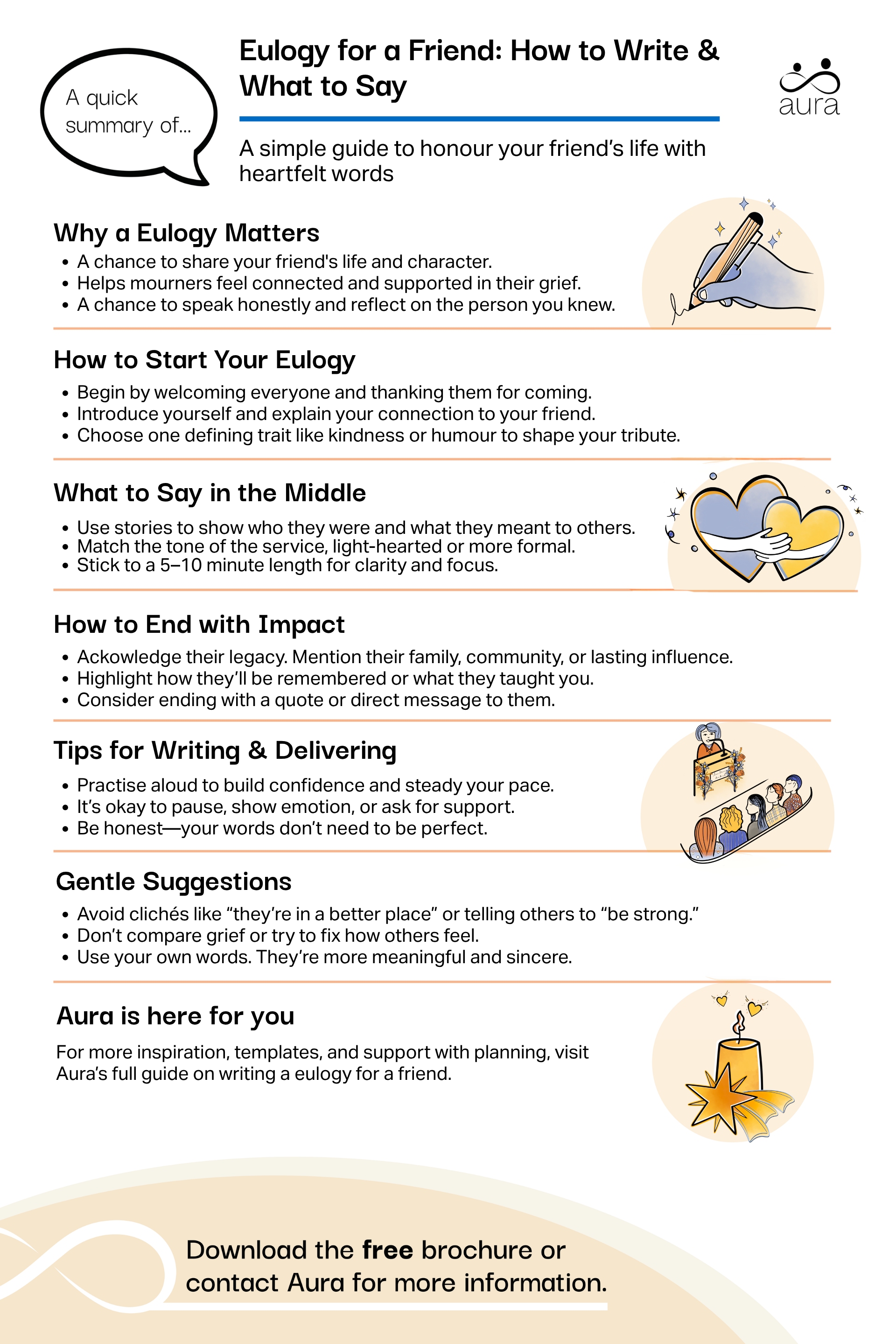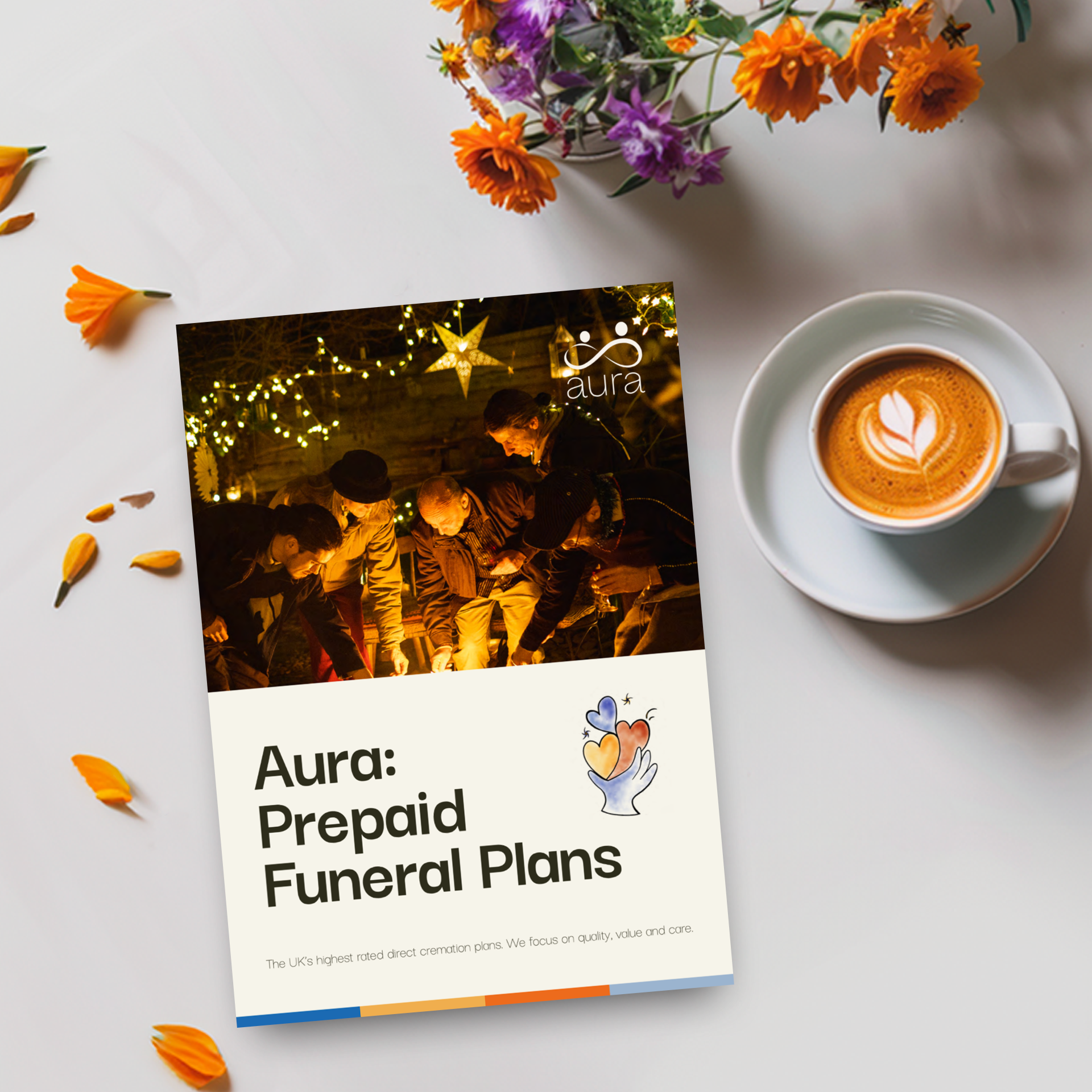


Written by Emily Cross.
18 minute read

For many of us, the death of a close friend may cause the same level of grief and emotional upset as a death in the family. You have a shared history, years of memories, and a connection that you may feel you cannot achieve with anyone else. It’s completely natural to want to honour them in a way that shows who they truly were and how they chose to live.
Many families and next of kin find that the prospect of reading the eulogy during the funeral service is too overwhelming or emotional, so they decide to ask a friend. If you are asked, knowing what to do may feel like a daunting prospect. There is pressure to get everything ‘perfect’ as well as your own nerves and emotions to deal with on the day.
In this guide, we want to help you find a way to write a heartfelt eulogy for a friend who has died so that you can play your part. When close family members are caught up with funeral plans, you might feel it’s not the right time to ask for their input and add to what they’re already dealing with. As a provider of direct cremation services, we work closely with families and loved ones from all backgrounds and can provide some thoughtful insights into possible ways to proceed.
We hope that you will find some words of inspiration and support in this article.
Key takeaways:

The delivery of a personal, heartfelt eulogy is one of the most widely followed British funeral traditions and one that has been retained by many families who choose a more alternative funeral or memorial service.
A eulogy is a spoken tribute that honours the life, character and memories of someone who has died. It’s often shared with those gathered at the funeral, offering stories, reflections, and moments that help others feel connected in their grief.
Rather than using clichés, it’s a chance to speak honestly, from the heart, about what the person meant to you, their family, and their friends. Finding the right tone can feel difficult, especially if you’re worried about saying too much or focusing too heavily on your own experience. But with time and care, you can shape a eulogy that feels thoughtful and respectful.
When a death, and especially an unexpected death of a loved one occurs, many mourners may feel a deep sense of loss, anger, and frustration. They come together at the funeral not only to pay their respects and remember their friend, but to share in the grief—so they can feel the comfort of not being alone in their loss.
When we are at home and grieving behind our front door, we might feel like we are the only ones dealing with such challenging emotions. The purpose of the eulogy is to play a central role in showing everyone in attendance that the person who has died touched potentially dozens and dozens of lives.
In the following sections, we’d like to relay some thoughts and suggestions on the key elements you may wish to include in a eulogy. Taking time to read through each suggestion may help you focus, clear your thoughts, and begin putting your words together with more ease.
We’re also happy to offer this article about eulogy templates, should you need more concrete guidance.
Perhaps the most common way to begin a eulogy is to warmly acknowledge everyone who has come to the service. Thanking them for being there, letting them know they’re appreciated, and helping them feel part of the moment can bring a sense of togetherness, something that often carries through into the conversations and connections made at the wake or any informal gathering that follows.
If you were a close friend, many people would already know who you are and what your bond was with the person who has died. But there may also be guests from other parts of their life—extended family or different circles of friends—who may not know you. With that in mind, it can help to briefly introduce yourself and explain your connection, sharing a little about what they meant to you.
From there, you might want to guide your speech with a theme. A simple way to do this is to focus on a defining part of your friend’s character, something that made them who they were, and then bring it to life through memories and stories. Some people choose love or loyalty, while others feel humour or kindness says it best. Taking a moment to reflect on what you’ll miss most, or what you admired most, can often lead you to the right words.
If you’re unsure whether your chosen theme feels right, remember that you’ve been asked to speak because your relationship meant something. The family has likely chosen you because they trust you to say what they might find too hard to say themselves.
If you’re feeling stuck or uncertain, a funeral celebrant can be a great support. They’ve helped many people shape eulogies and can offer advice, reassurance, or even help you put your thoughts into words if you’re struggling to begin.
A small selection of meaningful stories that reflect their personality and values while building on the theme you introduced in the opening may be suitable for the middle of the eulogy. You might also find it helpful to sit and reflect on the level of formality of the rest of the service and the way in which the family chooses to observe such traditions. This will help you to deliver stories that will make everyone feel comfortable and that align with the intentions of the family.
For example, if you know the family to be more traditional in how they deal with grief, a heartfelt story that reflects their loved one’s character in a warm and respectful way may feel most appropriate. On the other hand, families who share a similar sense of humour with the person who has died, or who use humour to cope, might welcome a few lighthearted moments. Thinking about how your friend was seen by those closest to them can help you strike a tone that feels right and honours their memory in a way that others will connect with.
There are also times when you may find it hard to decide which stories to include and which you prefer to leave out. A good guide may be to keep the eulogy within the 5-10-minute range and use this as your cutoff point. Many speakers find that this gives them time for 2-3 extended stories that can add a welcome personal touch to the eulogy that will be appreciated by their fellow mourners.
After setting the tone and sharing memories, you then need to sum things up and leave the audience with something to go away and think about. This can be the most daunting and difficult part of all because you may not feel qualified to start offering advice to an audience, but you don’t necessarily have to take this kind of approach.
Many speakers choose to focus on the influence their friend had on their family, friends, and the wider community. Taking a moment to pay tribute to their kindness, humour, resilience, or another defining quality they were known for may help you to draw things to a natural conclusion. You may then find that you can finish by sharing a few words on how their legacy continues to inspire those who knew them. Here are some ways you could potentially do this:
If you are unsure about how to finish, you find our article that covers a range of different eulogy examples helpful. Once you feel emotionally ready to read it, it may help provide you with direction or inspiration so that you can write an ending that you feel balances everything out and ties any loose ends together.

A eulogy is a spoken farewell that is delivered in front of all of your fellow mourners, and as such, it can understandably feel like a serious responsibility. At a time when you are likely already processing a complex range of emotions and a deep sense of loss, you may find it helpful to know what happens at a funeral so that you can understand the bigger picture.
By understanding the context and thinking about the nature of the rest of the service, you may find that you can find new ideas regarding the tone, delivery, and style you feel is most appropriate. You may also decide that you wish to run your words past a member of the family or another close friend so that they can give you some feedback. If you are able to make the time, doing so a few days before the service will allow you more time to make any adjustments you feel you wish to make.
One of the most common ways to express gratitude for having known someone is to highlight what you are going to miss most about them. It could be their way with words, a shared activity they used to enjoy with you, or even just the way they always found time for their friends and family. You know your friend as well as anyone, so you may wish to take your time and devote a period of reflection to this part. You may also find that doing so allows you to start the grieving process in a way that shows you that rather than your friend simply being no longer with you, they have left you with so much more you can remember and cherish for the rest of your life.
Sharing a lesson they taught you during the course of your life is another way to open yourself up and tell your fellow mourners what your relationship was like. Many in attendance may find solace and comfort in knowing that the person they loved touched the life of someone else in a way that has had a profound impact. You may wish to know that you do not have to feel pressure to share a truly life-changing moment — sometimes it’s the little lessons we learn along the way that are just as important.
The final few words are of course your own, but you may find that speaking directly to your friend helps bring things to a conclusion you feel comfortable with. Previously everything you have said may have been directed at the mourners in attendance, so finishing with a few words spoken to your friend can have the desired impact. Others find that closing with a famous quote that describes what your friend meant to you and the impact they have on the lives of many of the people they met feels right. Sometimes considering a few different options may help you to settle on something that you feel is a fitting tribute.
Tips for writing and delivering a eulogy with confidence
One of the most helpful things you can do is practise reading your draft aloud. This can help you feel more prepared and confident on the day. You may find the following tips useful:
We completely understand that it is not our place to dictate what you should and should not say during the eulogy, but there are some social conventions you may wish to be aware of.
Many of the most impactful, heartfelt eulogy examples for a friend we have had the honour of reading and hearing over the years chose to avoid using the following elements:
Delivering the eulogy may feel like it comes with its own unique set of pressures, especially if you are someone who is highly attuned to the need to avoid any kind of funeral arrangements disagreements. Taking a moment to note the above suggestions and social conventions may help you to lift your confidence and give you the freedom you need to start getting words down on paper.
When the family or next of kin asks you to deliver the eulogy it may help to remember that they see it as an honour and that they have so much trust in you. When the family was working through their funeral arrangements checklist, it was touching that they thought of you when it came to the eulogy. They know you, they love you, and they want you to play a central part in paying tribute at this time.
Although it is okay if you feel you do not want to bother them with too much at this time, you may find that a few quick questions can give you real insight and peace of mind. Hearing about whether or not they are playing uplifting funeral songs could help you to set the tone for your words, as can hearing a little about any end-of-life celebration ideas they may already have.
In the event that you find your nerves are getting the better of you, it may help to check with the next of kin that they are happy for you to write the eulogy but to deliver it alongside someone else. Having another close friend by your side may help provide the comfort and support you need to share your words and provide a fitting tribute.
We believe that everyone has the right to grieve and remember the death of a dear friend in any way they wish. A central part of this is delivering the eulogy and it is something that many families choose to ask a close friend to take care of. While you may find the prospect daunting at first, being kind to yourself and remembering that the family has asked you because they trust you can make a real difference to your state of mind. We also want you to know that you are never alone.
Our services may cover things such as prepaid funeral plans for those looking to put their affairs in order while still alive, and our resources often touch on topics such as how to compare funeral plans, but we also believe in going far further. Our online guides are here whenever you need them and are designed to provide a sense of comfort at a time when finding the right details or information can make a difference.
We invite you to explore our other funeral arrangements guides that cover things such as the nature of funeral services, funeral etiquette, and funeral flowers. By no means do we want you to feel obligated to do so — we just want to let you know that we are here whenever you need us.

Our brochure includes all the details you need surrounding our prepaid direct cremation funeral plans.
Get your free brochure sent by email or First Class post by clicking on the link below.
Talking about what you loved about your friend, what you will remember them for, and what they brought to your life will typically form the central part of the eulogy you deliver. Finding the right balance between light humour, paying your respects, and leaving your fellow mourners with a clearer picture of who your friend was is what it is all about. You may find that the act of writing down how you feel as you draft your eulogy gives you the time and space you need to begin processing how you feel.
There are a variety of different styles of quote you can include in a eulogy and the choice is ultimately left to the person who will deliver it. A common approach is to end with a short and powerful quote from a well-known figure. Doing so may allow you to tie everything together and end on precisely the type of sentiment you want to deliver. Here are three examples that may be helpful to consider:
One of the best ways to give a eulogy real authentic meaning is to begin with a few words about who you are. Although it is normal to feel self-conscious about doing so, it’s important to let everyone who attends know who you are so that they can listen to your words within the context of your relationship with the person who has died. Once they know you are close friends, they will know that any humour you may choose to use is in good taste and that the family has asked you because they trust your judgement.
While clichés often come to mind, you may decide that they have the unwanted effect of minimising the feelings of other people. Sometimes what you may feel most comfortable with are short, empathetic choices of words that show you are listening, that you care, and that you feel a similar sense of loss and grief. Meeting friends of the person who has died who are outside of your own friendship groups may help you find a sense of unity. It can also introduce you to new sides and memorable stories that you never knew before.
There is no set limit to a eulogy, but many choose to stick somewhere between 5-10 minutes. A eulogy of this length gives you enough time to tell several heartfelt stories and then end with a poignant or powerful choice of words that tie everything together. If you find that there is so much more you want to say, but you are mindful of overrunning, it may help to remember that a wake or memorial service afterward provides more time to share with others.
staging site last replicated: MISSINGNO.